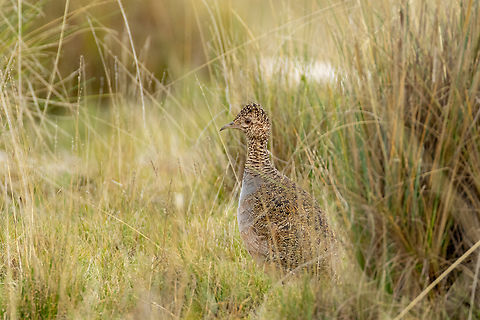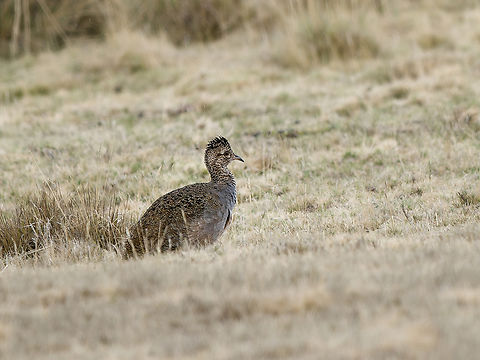
Appearance
The ornate tinamou is approximately 32 cm in length. Its upper parts are brownish-grey marked with black and buff, it is tawny-buff below with darker barring. Its head and neck are buff with prominent black spots, its bill is slender and curved, and its legs are either yellow or grey.
Naming
"Nothoprocta" comes from two Greek words, "nothos" meaning spurious or counterfeit and "prōktos" meaning hindpart or tail. Experts are unsure, however, they believe that this refers to the hidden tail of this Genus behind body feathers.The ornate tinamou has three subspecies as follows:⤷ "N. o. ornata" The nominate race occurs in the Andes of southeastern Peru, extreme northern Chile and western Bolivia
⤷ "N. o. branickii" occurs in the puna of central Peru; Ancash, Lima, Ica, Junín, Ayacucho, Huancavelica, and Apurímac Regions
⤷ "N. o. rostrata" occurs in the Andes of northwestern Argentina; Jujuy and La Rioja Provinces
Status
The IUCN list this species as Least Concern, with an occurrence rang eof 740,000 km2.Behavior
Like other tinamous, the ornate tinamou eats fruit off the ground or low-lying bushes. They also eat small amounts of invertebrates, flower buds, tender leaves, seeds, and roots. The male incubates the eggs which may come from as many as 4 different females, and then will raise them until they are ready to be on their own, usually 2–3 weeks. The nest is located on the ground in dense brush or between raised root buttresses.Habitat
The ornate tinamou lives in high-altitude grassland. They also live in shrubland, both high and low elevation, and they are showing some success of living on farmland. They prefer elevations of 3,450 to 4,700 m.References:
Some text fragments are auto parsed from Wikipedia.